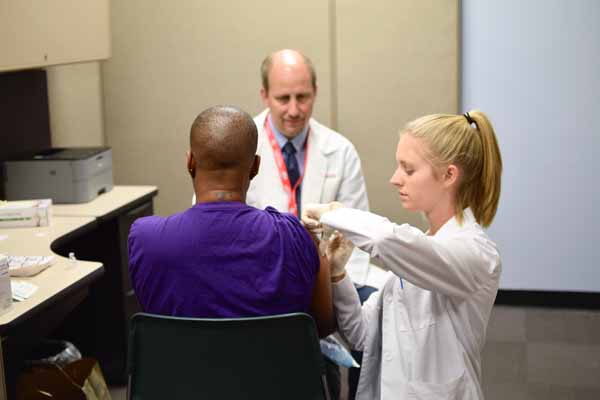
In a move long called for by the Texas Medical Association, the two organizations that run the United States Medical Licensing Examination (USMLE) announced last week that they have ended the USMLE Step 2 Clinical Skills (CS) portion of the USMLE examination.
“After reviewing current and anticipated progress with the exam and in consideration of the rapidly evolving medical education, practice, and technology landscapes, we have decided to discontinue Step 2 CS,” the organizations announced on the USMLE website.
TMA had supported eliminating the Step 2 CS portion, in part because it was a huge financial and logistical burden for the third- and fourth-year students.
Since 2004, allopathic medical students have had to pass the three-step USMLE exam to obtain medical licensure in the U.S. The Step 2 CS portion of the exam assessed clinical skills by having students examine and diagnose actors posing as patients.
Because the Step 2 CS required close human interaction, the National Board of Medical Examiners (NBME) and the Federation of State Medical Boards (FSMB) had suspended this part of the USMLE in May to prevent the spread of COVID-19.
The suspension prompted calls by medical students and medical school administrators to cancel the test entirely.
In July 2020, USMLE program officials asked for input from the medical education community about charting the future of Step 2 CS. TMA’s Council on Medical Education responded by outlining its objections to keeping the clinical skills exam in a July 31 letter signed by TMA President Diana Fite, MD. Those objections pointed out the exam’s:
- Limited educational benefits: Test scores were often slow to arrive and there was very little feedback for students or their medical schools to understand why some failed and how they could improve.
- High cost: The $1,300 price tag was onerous for students. Also, there were only five cities in the U.S. – Houston, Atlanta, Chicago, Los Angeles, and Philadelphia – where students could take it. Most students had to add the cost of travel and at least one night in a hotel to the total cost of the exam.
- Limited value in screening physicians: The CS exam had an exceptionally high passage rate – 95% in 2018-19 – indicating that the exam did little to weed out physicians who were deficient in clinical skills.
Osteopathic medical students are required to take a different clinical skills test – the COMLEX Level 2-PE clinical skills exam, which is administered by the National Board of Osteopathic Medical Examiners (NBOME). Like the USMLE Step 2 CS, it has been suspended in response to the pandemic, but NBOME plans to continue requiring its clinical skills exam, according to a Jan. 28 announcement.
USMLE acknowledged in its announcement that “independent standardized assessments of medical knowledge and clinical skills are important inputs for state medical licensure decisions.” In the absence of Step 2 CS, USMLE said, “elements of clinical reasoning and communication will continue to be assessed on other exams (Steps) in the USMLE sequence.”
Because medical schools teach and assess students’ clinical skills, the USMLE Step 2 CS was redundant, says Kevin Klein, MD, a professor of anesthesiology and pain management at UT Southwestern Medical School in Dallas and chair of TMA’s Council on Medical Education.
“Medical schools typically know better which [students] should not be promoted,” he said.
With the removal of Step 2 CS, the USMLE exam now will consist of the following steps, according to an NBME spokesperson:
- Step 1 is a one-day test usually taken at the end of the second or third year of medical school. It assesses whether students can apply important concepts, with special emphasis on the principles and mechanisms underlying health, disease, and modes of therapy.
- Step 2 Clinical Knowledge is a one-day test for third- and fourth-year medical students focused on clinical sciences like internal medicine, surgery, and gynecology.
- Step 3 is a two-day test usually taken after the first year of residency. It assesses whether residents can apply the medical knowledge and understanding of biomedical and clinical science essential for the unsupervised practice of medicine.